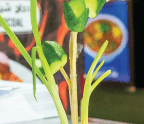Selim the half-wit hoarded everything—that was the story they told me my first day in waste management. Selim had lost his wife, and I guess everyone figured he took up hoarding as a way to fill the void. It started out with stuff his wife might have liked—small earrings, a tea set, owl statuettes—picked out of garbage bins. Well, Selim ended up with a house packed to the rafters with trash he thought was gold. He tucked it onto shelves and into stacks, put it in cupboards, crammed it under floorboards, couch cushions, and the mattress, until there was no space left but overhead. Then he installed a system of boards and beams into the frame of the house, with maybe two or three inches of clearance from his head, in order to pile trash above him. More and more he took from the waste bins: old, tattered books, bicycle bits, apple cores, orange peels, broken printers, smashed-up furniture, crumpled cartons and boxes, hundreds of pounds of paper, pens, eyeglasses, eggshells, water bottles, shoes with holes, sleeping bags with urine stains, jackets too small, jackets too large, bed frames, filing cabinets, coffee mugs, coffee grounds—on and on an impossible list of trash weighed down on those boards and beams until at last, while his dreams of finding his wife in all this waste were licking the night sky, the house’s framing broke and the collected works of the city’s refuse crashed down upon Selim the half-wit, killing him not instantaneously, but swiftly enough to confuse him into believing in his deliverance.
The garbagemen laughed at the end of the story, and then the oldest one, without a hint of jest, indeed with genuine concern, said to me: “And you are doubly at risk, because a woman hoards more than a man.”
And the other garbagemen stopped their laughing and nodded solemnly. The nearest to me said: “We make light of a truth; it is easy to find the merits in another’s garbage if only because it reminds us of the mortality of our own legacies.”
I smiled and laughed and so did they, and they all went out to their tasks. I found my assignment: a truck helmed by two men named Hamdi and Mehmet. I hopped into the cab. The older man, Hamdi, drove us off to our route, and as he did Mehmet said that I shouldn’t take anything the others said seriously. “Garbagemen, for who knows why, make up myths and tales more readily than any other profession. Still, it is not good to take from the trash. Once you start, there’s no stopping. Eventually you’ll find yourself buried under it.”
A DAY BECAME A WEEK, became a month, became a year, as it happens. Mehmet and Hamdi made me go down the thinnest alleys of Beyoğlu because they had round bellies they couldn’t squeeze between the buildings, and they laughed at themselves so that their laughter accentuated their jiggling bellies. They gave me a slender handcart to navigate and said, So long, we’ll see you at the end of the maze.
I went down the alleys because I was the thinnest, but it’s not hard to be the thinnest garbageman when you’re a woman. My small handcart scraped its sides against brick and stucco and stone—sometimes my shoulders, too, would scrape the walls, and I worried that over time I might erode a small, Fatima-shaped tunnel into the alley, or worse, that the alley would grind me down into a rectangle.
I stopped at the back doors and loading zones, the garbage bins always stuffed to overflowing, but really only half full because people are very bad at the economy of space. I emptied the bins into my handcart and continued on to the next little station, on and on all afternoon until I came out the other end of the labyrinthine alleyways soiled and sweating and reeking. Then I waited for Mehmet and Hamdi to finish their route in the truck and pick me up. They


